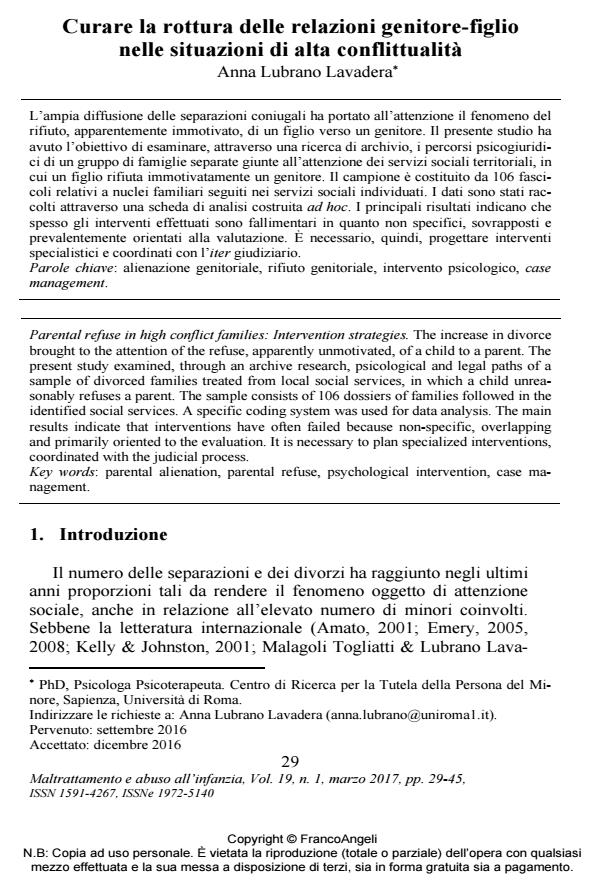Curare la rottura delle relazioni genitore-figlio nelle situazioni di alta conflittualità
Titolo Rivista MALTRATTAMENTO E ABUSO ALL’INFANZIA
Autori/Curatori Anna Lubrano Lavadera
Anno di pubblicazione 2017 Fascicolo 2017/1
Lingua Italiano Numero pagine 17 P. 29-45 Dimensione file 198 KB
DOI 10.3280/MAL2017-001003
Il DOI è il codice a barre della proprietà intellettuale: per saperne di più
clicca qui
Qui sotto puoi vedere in anteprima la prima pagina di questo articolo.
Se questo articolo ti interessa, lo puoi acquistare (e scaricare in formato pdf) seguendo le facili indicazioni per acquistare il download credit. Acquista Download Credits per scaricare questo Articolo in formato PDF

FrancoAngeli è membro della Publishers International Linking Association, Inc (PILA)associazione indipendente e non profit per facilitare (attraverso i servizi tecnologici implementati da CrossRef.org) l’accesso degli studiosi ai contenuti digitali nelle pubblicazioni professionali e scientifiche
L’ampia diffusione delle separazioni coniugali ha portato all’attenzione il fenomeno del rifiuto, apparentemente immotivato, di un figlio verso un genitore. Il presente studio ha avuto l’obiettivo di esaminare, attraverso una ricerca di archivio, i percorsi psicogiuridici di un gruppo di famiglie separate giunte all’attenzione dei servizi sociali territoriali, in cui un figlio rifiuta immotivatamente un genitore. Il campione è costituito da 106 fascicoli relativi a nuclei familiari seguiti nei servizi sociali individuati. I dati sono stati raccolti attraverso una scheda di analisi costruita ad hoc. I principali risultati indicano che spesso gli interventi effettuati sono fallimentari in quanto non specifici, sovrapposti e prevalentemente orientati alla valutazione. È necessario, quindi, progettare interventi specialistici e coordinati con l’iter giudiziario.
Parole chiave:Alienazione genitoriale, rifiuto genitoriale, intervento psicologico, case management.
Anna Lubrano Lavadera, Curare la rottura delle relazioni genitore-figlio nelle situazioni di alta conflittualità in "MALTRATTAMENTO E ABUSO ALL’INFANZIA" 1/2017, pp 29-45, DOI: 10.3280/MAL2017-001003